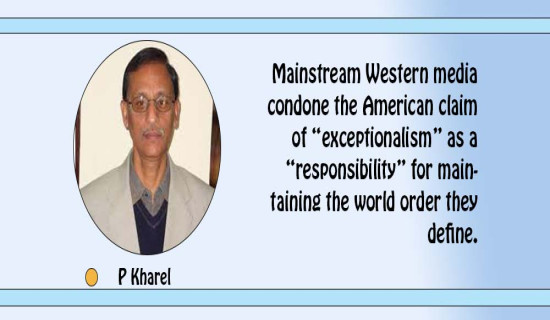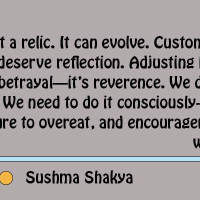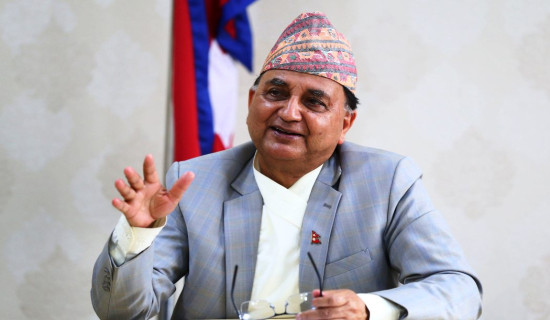- Monday, 4 August 2025
Honing Rationality Of Interest Articulation
Interest articulation is one the vital constants of democratic politics. It is a strategy of mature people to express their needs, rights, interests and issues to political parties, public sphere and polity. Transmission of messages by Nepali leaders to people to allure them, however, is marked by the tumult of shouting, speaking and waving leaving no room for reason, conscious reflection and conversation. The rationality of interest articulation brings about the condition of peoples’ living, disposition of power and distribution of intelligence in the social structure, system of control and leadership ability to hear the rhythm of public utterances. It shapes the idioms of political life by setting a balance between inputs and outputs of the polity.
Nepali leaders’ highly rhetorical style of rousing the emotion of people to reach out to them may be electric, offensive, dull and dry, sober or flip to the leery of deceit and sleaze. Politics turns empty if it does not serve public good and leaves people to freeze in the reality of power without policy once elections are over. The captivating power of articulation is well defined by its driving effects. It awakens the sober hearts and minds of silent masses to move to consequential activities and bridges the chasm that divides the leadership from people on public and national interests, sapping national will in crisis times. The tone of articulation can be lawful, impassioned, pushy or radical where demands are contestable or just non-negotiable as it aspires for structural reforms even regime change.
Fawning circle
No Nepali leader can rise up to the majestic height of full political scale without ably articulating the claim, voice and visibility of people through media and spawn a ripple of hope that vaults opportunity and keeps authority effortlessly floating. The dose of eulogy of political bosses as statesmen by their fawning circle despite their failure to elevate themselves to leadership and think in generational terms only blows up their ego like Dr Frog leading to a perilous path. The statesman is driven by realistic vision, conscience, moral streak and positive outcome. Youths’ only dream to go to far-off places for improving their lot eludes this rank.
The alchemy of interest articulation is an art of enthusing in Nepalis a spirit of inquiry, critical sense of evaluation of leadership and the common voice for collective action in setting the track of politics. It is not just a sound-bite but a powerful means for Nepalis for self-reflection and cognitive expression of ideas, beliefs, purpose and practices in the public sphere for attention and engagement. It is also about how Nepali leaders match with the values treasured by people for a symbol of bigger social change. The modern value of leadership is based on trust, persuasion and team spirit for bridge building, not coercion, pressure and control that divides the people and possible leaders by walls. Their styles, values and preference matter for unproblematic democratic progress. Nepali leaders' ability to stand up for constitutional ideals and perk up the lots of people who look down on them enables them to keep alive the flame of freedom, justice and peace.
Conversion of divergent interests of Nepalis into their common rights provides a shared background for civic life and shores up the eloquence of wits and democratic citizenship, an ability to see themselves not simply citizens of the nation, but also rational human beings bound to citizens of other nations by ties of mutual recognition, common concern, common good and tolerance to plurality. The tendency of Nepali leaders to shelve issues rather than solve them one by one has created an overload of grievances in the system unable to carry. Civil society and media are helping people to read this and help them to actualise, animate, assert, identify and articulate their concerns and blow off their steam of activism. The degree of social modernisation in Nepal is uneven, sluggish and slothful making the deficits of articulating agencies.
In highly developed parts it is often caught up in the powerful spell of either leaders’ innocent adulation or dire criticism, not restrained by civic decency. So does the pattern of political education and interest aggregation eased by rights-based constitution, development and democracy. It has spawned the explosion of many articulating associations, federations, unions, networks, societies and social movements which are awakening the consciousness of people but afflicted by a lack of control over anything. Only keeping the proportionality of rights with duties can enable leaders and people to give up part of their interests for public good, craft a sane order of reformist type and control the pull of populist politics. Otherwise, the disjuncture between politics and law will consume the integrity and virtue of the other or even collude in mutually serving ways.
Nepali leaders must have the capacity to know, interpret and alter the condition of Nepalis lives as per the ideal vision of an impersonal polity and titillate a stimulate fit to govern national affairs. The traditional method of political articulation was through communal frame with diffused interests each simmering with its own style of informal face-to-face contact and communication. The group basis of politics is now flattened by the rise of individualism and resolution of tension between human rights and democracy in favour of the former. The collective form of life built by democratic solidarity too is replaced by network-based society with the decline of ideological politics.
The monopoly of interest expression through official medium has now spread into various mediums of associational groups — hierarchical ones like political parties’ chain of command and control, utilitarian one regulated by free collective bargaining in trade unions and business association, shared sentiments of functional federations governed by the spirit of cooperatives, irrigation, local bodies and professional groups, horizontal associations of a myriad of civil society founded on education and advocacy, projectised ones indulged in social engineering, voluntary groups based on charity and cultural groups such as Guthis, the custodian of culture. The bubble up of these uncoordinated agencies has helped the political life of Nepalis transparent, articulate and reflective self-expression of the cycle of hope struggling to lift up their dreams for optimal fit.
The continuous exposure of Nepalis to independent media, public debate and political activities has made them attentive, active, fluent, democratic and demands articulating. This marks the spur of an interface between the traditional and modern means of interest expression but also a disclosure of a widening gap in the substance of promises of leaders and their eroding creditworthiness. The language of politics in Nepal is marked by exaggerated sense of leaders’ personality, not their functional and specialised efficiency required of their competitive qualities, alternative visions and policies which often collides with resource constraints and problem solution thus turning politics combustible. Accumulation of social, economic and political vices and woes indicate that the essential standards of politics in Nepal is down, sullied and depreciated habitually inept to grasp the core of the constitution and fairer aspect of the surface level of life.
Effective and credible interest articulation by Nepali leaders can remove the tradeoffs between their promises, mindfulness and their capacity to overcome self-estrangement. Nepali polity can keep its dynamics by improving the degree of feedback between leaders and people at the grassroots level who appeal to different concerns and issues — personal and political. Ironically, leaders are attuned to addressing the crowd in an abstract manner with generalised appeal delinked from individuals' concern, their emotional intelligence and feeling. Too much party-mindedness of Nepali leaders has caused a biased expression of interests and erosion of culture of impartiality in fulfilling the public expectations for the bulge of opportunity so that even the poor have a stake in democracy. Deficient aggregation and representation of people’s interest means losing credibility and political support to them.
Critical democratic sense
The time has come for them to choose between the emergent revival of cadres’ critical democratic sense and safeguarding the unity and discipline of the party by inclusive and broad-based aggregation and articulation of public interests through inquiring, listening, consultation and deliberation beyond the weary rehearsal of ego. In a sense, the legitimacy of the political process rests on the style of articulation. It is highly rewarding for Nepalis to know the state of democracy and stabilise political life by bridging the growing split between the secularity of politics and its lack of value-based acculturation.
The worthy job of political parties in interest articulation lies in expressing the needs, interests, demands and claims of people to the decision making of Nepali polity. Countless institutions exist to assume this role at various scales. Interest groups are located both inside the polity such as civil service organisations and outside it. Managing them within the bounds of the constitution is crucial so that articulation of popular demands is not overshadowed by the din of special interest groups. In each political change Nepalis yearn for higher practical ends than those advertised by their leaders full of political jargons against the enormous array of the nation’s ills whose solutions are required to offer democratic and peace dividends and enable people to act together in nation-building.
(Former Reader at the Department of Political Science, TU, Dahal writes on political and social issues.)

















